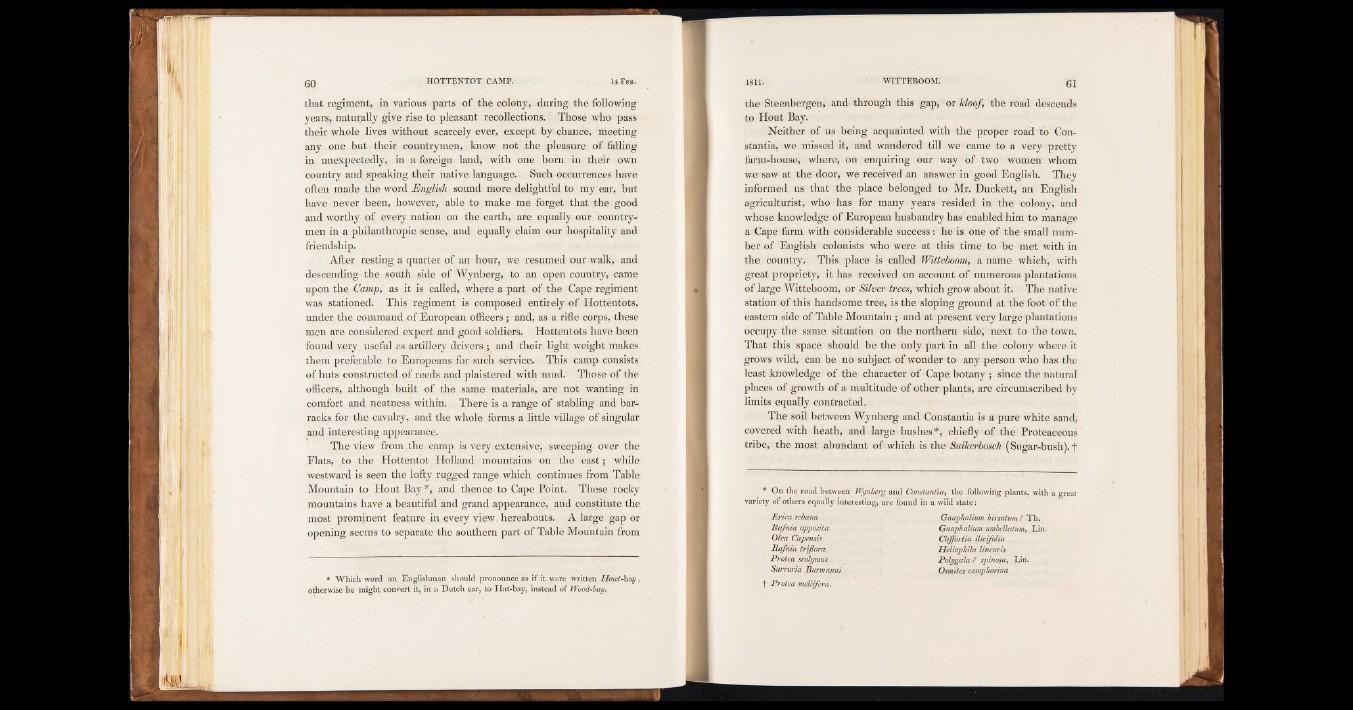
that regiment, in various parts of the colony, during the following
years, naturally give rise to pleasant recollections. Those who pass
their whole lives without scarcely ever, except by chance, meeting
any one but their countrymen, know not the pleasure of falling
in unexpectedly, in a foreign land, with one born in their own
country and speaking their native language. Such occurrences have
often made the word English sound more delightful to my ear, but
have never been, however, able to make me forget that the good
and worthy of every nation on the earth, are equally our countrymen
in a philanthropic sense, and equally claim our hospitality and
friendship.
After resting a quarter of an hour, we resumed our walk, and
descending the south side of Wynberg, to an open country, came
upon the Camp, as it is called, where a part of the Cape regiment
was stationed. This regiment is composed entirely of Hottentots,
under the command of European officers; and, as a rifle corps, these
men are considered expert and good soldiers. Hottentots have been
found very useful as artillery drivers ; and their light weight makes
them preferable to Europeans for such service. This camp consists
of huts constructed of reeds and plaistered with mud. Those of the
officers, although built of the same materials, are not wanting in
comfort and neatness within. . There is a range of stabling and barracks
for the cavalry, and the whole forms a little village of singular
and interesting appearance.
The view from.the camp is very extensive, sweeping over the
Flats, to the Hottentot Holland mountains on the east j while
westward is seen the lofty rugged range which continues from Table
Mountain to Hout Bay *, and thence to Cape Point. These rocky
mountains have a beautiful and grand appearance, and constitute the
most prominent feature in every view, hereabouts. A large gap or
opening seems to separate the southern part of Table Mountain from
* Which word an Englishman should pronounce as if it were written Uoivt-bay,
otherwise he might convert it, in a Butch ear, to Hat-bay, instead of Wood-bay.
the Steenbergen, and through this gap, or kloof \ the road descends
to Hout Bay.
Neither of us being acquainted with the proper road to Constantia,
we missed it, and wandered till we came to a very pretty
farm-house, where, on enquiring our way of two women whom
we saw at the door, we received an answer in good English. They
informed us that the place belonged to Mr. Duckett, an E n g l is h
agriculturist, who has for many years resided in the colony, and
whose knowledge of European husbandry has enabled him to manage
a Cape farm with considerable success: he is one of the small number
of English colonists who were at this time to be met with in
the country. This place is called Witteboom, a name which, with
great propriety, it has received on account of numerous plantations,
of large Witteboom, or Silver trees, which grow about it. The native
station of this handsome tree, is the sloping ground at the foot of the
eastern side of Table Mountain; and at present very large plantations
occupy the same situation on the northern side, next to the town.
That this space should be the only part in all the colony where it
grows wild, can be no subject of wonder to any person who has the
least knowledge of the character of Cape botany ; since the natural
places of growth of a- multitude of other plants, are circumscribed by
limits equally contracted.
The soil between Wynberg and Constantia is a pure white sand,
covered with heath, and large bushes*, chiefly of the Proteaceous
tribe, the most abundant of which is the AW&er&oscA (Sugar-bush). j~
* On the road between Wynberg and Constantia, the following plants, with a great
variety of others equally interesting,-are found in a wild state:
Erica sebana
Rafhia opposita
Olea Capénsis
Rafhia triflora
Protea scolymus
Sumiría Burmanni
Gnaphalium hirsutum ? Th.
Gnaplialium umbellatum, Lin.
Cltffbrtia ilicifolia
Heliophila linearis
Polygala P spinosa, Lin.
Osmites camphorina
t Protea mellifera.